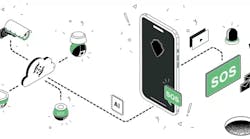In a move that did not come as a surprise after weeks of speculation and buildup, the Federal Communications Commission (FCC) on Thursday voted to end what is known as “net neutrality.” The question – one that SD&I actually posed in an article three years ago – is how this will affect the security industry, especially when it comes to video surveillance monitoring.
Before embarking on a deep dive into its ramifications for our industry, here is a brief primer on what net neutrality really is. Quoting Shayne Bates’ 2014 article: “traditionally, net neutrality is based on the principle that all Internet traffic and its content – flowing to and from destinations – should be treated equally, and that Internet Service Providers (ISPs) should not pick and choose what to give preference to, or cut traffic off in favor of their own preferences; thus the term ‘neutrality.’”
The whole concept seems to makes sense; however, opponents to net neutrality – including new FCC Chairman Ajit Pai – call it heavy-handed regulation. “From passage of the Telecommunications Act of 1996 until 2015, the Internet underwent rapid, and unprecedented, growth. ISPs invested approximately $1.5 trillion in building networks, and American consumers enthusiastically responded. During that time, there was bipartisan agreement that the Internet should be free of burdensome regulation so that it could continue to flourish,” the FCC explains on its website.
“Two years ago, the FCC abruptly changed course. On a party-line vote, the FCC applied 1930s-era utility-style regulation ("Title II") to the Internet. That decision appears to have put at risk online investment and innovation, threatening the very open Internet it purported to preserve. Requiring ISPs to divert resources to comply with unnecessary and broad new regulatory requirements threatens to take away from their ability to make investments that benefit consumers.
“In place of that heavy-handed framework, the FCC is returning to the traditional light-touch framework that was in place until 2015; moreover, the FCC today also adopted robust transparency requirements that will empower consumers as well as facilitate effective government oversight of broadband providers’ conduct,” a statement yesterday reads. “In particular, the FCC’s action today has restored the jurisdiction of the Federal Trade Commission (FTC) to act when broadband providers engage in anti-competitive, unfair, or deceptive acts or practices.”
There are hundreds of sources where you can read about how this might affect your Netflix and Hulu streaming video services, but how will this affect the security industry in particular? While your first thought might surround streaming of 4K surveillance video; most security industry insiders agree that potential unfair business practices are where this industry needs to pay attention.
Fears of Our Industry
Back in 2014, Bates posited that video surveillance providers who want to use a Software as a Service platform would be effected by a revocation of net neutrality. Indeed, streaming high definition video may be affected if ISPs decide to create Internet “fast lanes” for content.
In 2017, these fears are still present, but the true impact of this decision has more to do with the current competitive climate for security service providers, who are increasingly finding themselves in direct competition with the very ISPs who are targeted with this ruling.
“Our biggest concern is that an Internet provider who also provides alarm services can throttle or block the services of an alarm company in favor of its own alarm entity,” explains Lou Fiore of The Monitoring Association. “This would be especially critical when a broadband service such as video is concerned.”
Adds Security Industry Association CEO Don Erickson: “Alarm companies depend on services offered by ISPs, while ISPs increasingly offer their own security monitoring, installation and related services. The security industry has sought to eliminate the potential for anti-competitive practices involving broadband access, so we are disappointed that the new FCC Order does not retain the “Bright Line” rules prohibiting blocking, throttling, affiliate prioritization or paid prioritization. While the Order requires public disclosure of any such activities or arrangements to provide the transparency necessary for the Federal Trade Commission (FTC) to address potential anticompetitive conduct, companies could face potentially lengthy FTC proceedings, affecting their ability to compete, if our industry encounters unfair practices.”
For its part, Comcast – one of those ISPs who are in direct competition with traditional security service providers – has already gotten in front of this issue. While Comcast corporate executives would not comment to SecurityInfoWatch specifically on alarm industry-specific concerns regarding net neutrality, they did direct us to the company’s prepared statement on the issue.
“We have repeatedly stated, and reiterate today, that we do not and will not block, throttle, or discriminate against lawful content,” the statement reads. “These fundamental tenets of net neutrality are also key components of our core network and business practices.”
The statement adds that Comcast broadband customers will still be able to visit any lawful site they want to, it will not block or throttle access to any Internet sites; and will not create Internet fast lanes.
“The protections that exist for the alarm industry in the Telecommunications Act of 1996 that prohibits anti-competitive behavior by common carriers who compete in the electronic security industry will remain in place and the FCC will continue to enforce those provisions should issues arise,” says Electronic Security Association president Angela White.
All that said, the lives and safety of customers is always paramount to security service providers, and anything that even remotely threatens these life safety-centric services should be minded.
“Our priority is ensuring emergency communications involving security and life safety systems are not impeded, and that Americans can access and fully benefit from the latest security technology,” Erickson says. “The increasing use of video data and mobile broadband within a broad range of emergency communications systems requires reliable service. We are hopeful that Congress will take the opportunity to consider new legislation enacting a targeted set of rules governing broadband access that also protects the alarm industry against any potential anti-competitive practices.”
Nearly every proponent of this new “light touch” rule has reiterated – much like Comcast has – that everything will go on as usual on the Internet. Let’s hope the same holds true for any anti-competitive behavior that may affect the security industry.
Note: To read the FCC’s full statement on this new regulation, as well as on-the-record comments from Ajit Pai and other proponents and opponents of this move, visit: www.fcc.gov/document/fcc-takes-action-restore-internet-freedom.
Paul Rothman is Editor in Chief of Security Dealer & Integrator (SD&I) magazine. Access the current issue, archives and subscribe at www.secdealer.com.






